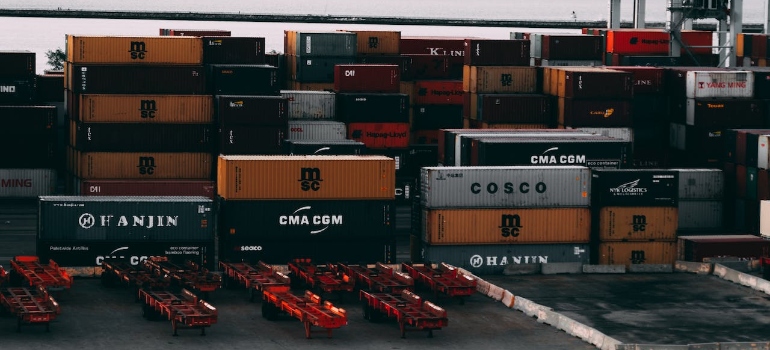Growth of E-commerce and Its Impact on Shipping
The surge in e-commerce has been nothing short of revolutionary, fundamentally altering how we shop and sell. This digital shopping revolution, ever-present across the United States, has led to a seismic shift in the logistics and shipping industry, with a particularly noticeable impact in bustling urban centers like Seattle. As for shipping and moving companies in Seattle, this e-commerce growth has translated into a diversification of services—from the traditional house move to the intricate logistics of delivering goods right to the consumer’s doorstep. Against this backdrop, this article examines the various aspects of the growth of e-commerce and its impact on shipping in recent years.
The Rise of E-commerce in the U.S.
E-commerce has rapidly expanded within the U.S. market, revolutionizing retail and consumer purchasing behaviors. Over a few years, online shopping has transitioned from a convenience to a central component of the retail sector. And the numbers are telling: each year, a larger portion of retail sales are conducted online, underscoring the growing preference of consumers to engage with digital marketplaces.
The ubiquity of internet access and the widespread adoption of smartphones have catalyzed this trend. Enhanced user interfaces, streamlined checkout processes, and fortified cybersecurity measures have made e-commerce platforms more appealing to the average consumer. Furthermore, this ease of access and increased security have led to heightened consumer confidence in online transactions.
Seattle, known for its robust tech industry and innovative startups, is a microcosm of this national shift toward e-commerce. The city’s consumers, well-versed in digital technologies, have not just adapted to but have come to expect a sophisticated online shopping experience. They also look for quick delivery, diverse product offerings, and competitive pricing—all hallmarks of a mature e-commerce ecosystem.

The transition to e-commerce has necessitated a reimagining of retail strategy, with traditional brick-and-mortar stores integrating online sales models to remain competitive. This phenomenon is not isolated. It reflects a broader national trend particularly pronounced in tech-centric cities like Seattle. It impacts not only commercial strategies but also shapes the economic and social landscape of the community.
E-commerce and the Evolution of Consumer Expectations
The growth of e-commerce and its impact on shipping has significantly transformed consumer expectations for delivery services. Where once the standard was to wait several days for a package, today’s consumer anticipates a much swifter turnaround. “Two-day shipping” has become the norm, with many customers willing to pay premiums for even faster service. This demand for speed has not only altered the landscape of domestic shipping but has also put pressure on international commercial shipping companies to expedite their delivery processes, given the global nature of e-commerce.
The emphasis on fast shipping has become a key factor in the online purchasing decision. Retailers that offer expedited shipping options often see higher conversion rates, as immediate gratification becomes a significant driver of consumer behavior. In competitive markets like Seattle, where e-commerce is particularly entrenched, the ability to offer quick and reliable shipping can be a decisive factor in winning customer loyalty.
Moreover, the notion of “free shipping” has become a strategic marketing tool, often tipping the scales in favor of one retailer over another. While consumers in Seattle and beyond are primed to expect fast and free delivery, the reality is that complex logistics and cost considerations underpin these services. Behind the scenes, international commercial shipping companies and local delivery services alike are investing heavily in logistics infrastructure to meet these elevated expectations.
The psychological impact of these shipping options is profound. They not only influence purchasing decisions but also shape the way consumers perceive a brand’s value and service quality. In this environment, retailers and shipping companies must continually innovate to provide shipping solutions that meet and exceed these expectations while maintaining economic viability.

Challenges for Shipping and Logistics
The e-commerce surge has revolutionized the shopping experience but concurrently introduced significant logistical complexities. Shipping companies in Seattle, alongside their national and international counterparts, face various challenges in their operations due to the increasing demands of online consumers. These challenges can be outlined as follows:
- Last-Mile Delivery Complexity
- Environmental Concerns
- Cost Pressures
- Scalability and Flexibility
- Managing Returns
- Technological Integration
- Regulatory Compliance
Understanding and addressing these challenges is crucial for shippers to stay competitive and provide the high level of service that e-commerce customers have come to expect.
Last-Mile Delivery Complexity
The last stretch of delivery, known as the last mile, presents a complicated set of issues, particularly in congested urban spaces like Seattle. The complexity lies in ensuring timely deliveries amidst unpredictable traffic, providing real-time updates to customers, and maintaining cost-effectiveness.
In Seattle’s urban sprawl, the congestion and layout present a significant challenge for timely deliveries. Experienced shipping companies Seattle has combat this by utilizing advanced routing algorithms that account for real-time traffic conditions, thereby reducing delays and improving efficiency.
Environmental Concerns
Increased delivery frequency has inevitably led to concerns about the environmental impact. To address this, companies are investing in electric delivery vehicles and optimizing routes to decrease fuel consumption and emissions. Some even experimented with bicycle delivery services for smaller parcels to minimize their carbon footprint.
Cost Pressures
The expectation for fast, and frequently free shipping is at odds with the actual costs involved in the logistics chain. To mitigate cost pressures while meeting consumer expectations for fast, free shipping, companies in Seattle are innovating with tiered shipping models, offering a range of options from standard to expedited delivery at various price points. This allows customers to choose a balance between cost and speed.

Scalability and Flexibility
The ability to scale operations efficiently during peak shopping seasons is another challenge. Companies need to have the flexibility to ramp up their logistics capacity to handle surges in order volumes without sacrificing delivery times or customer service. Shipping companies in Seattle are addressing this by adopting scalable logistics models that can dynamically adjust to changing demand, using a combination of full-time and gig economy workers to handle the ebb and flow of shipping needs.
Managing Returns
With the rise of e-commerce comes an increased volume of product returns. Efficiently managing these returns is a logistical challenge that requires a streamlined process for sorting, assessing, and reintegrating products back into inventory. In response, some Seattle-based companies have set up dedicated return centers to streamline the process, ensuring that returned products are quickly sorted, inspected, and either restocked or redirected as necessary.
Technological Integration
Staying current with technological advancements is essential. This could mean investing in advanced package tracking systems, automated sorting, or robotics to stay competitive, particularly in a tech hub like Seattle. Hence, from AI-driven customer service chatbots to blockchain for secure and transparent record-keeping, these last-mile tech improvements are streamlining operations and enhancing the customer experience.
Regulatory Compliance
Adhering to the myriad of regulations that govern shipping and transport, both domestically and internationally, remains a constant challenge. Compliance is essential, but it must be achieved without undermining operational efficiency. So, in response to the challenges of the growth of e-commerce and its impact on shipping companies in Seattle, companies are:
- Adopting new technologies and practices;
- Fostering partnerships with local businesses to create a more integrated shipping ecosystem;
- Leveraging Seattle’s tech resources to improve their logistics platforms;
- Implementing advanced data analytics to predict demand patterns and optimize inventory management.
Moreover, they are actively engaging with policy-makers to shape regulations that support sustainable growth in the shipping industry while also investing in workforce development programs to ensure that they have the skilled personnel needed to manage these advanced logistics systems.

E-commerce’s Economic Impact on Shipping
The e-commerce boom has fundamentally altered the economic landscape of shipping. For shipping and freight companies in Seattle and across the country, the rise of online shopping has translated into a significant increase in demand for their services, creating both opportunities and challenges.
Growth and Revenue
E-commerce has directly contributed to the growth in the shipping sector’s revenue. With the increase in online sales, there is a greater need for transporting goods from warehouses to consumers. This has resulted in an uptick in business for shipping companies, which now handle a higher volume of parcels than ever before.
Job Creation
This growth has also spurred job creation within the shipping industry. As the demand for shipping services increases, so does the need for warehouse workers, drivers, logistics managers, and customer service representatives. In Seattle, with its vibrant economy, the shipping industry is a significant employer, offering a range of jobs from entry-level positions to high-skilled roles.
Infrastructure Development
To accommodate the increased load, there’s been a push for infrastructure development. Seattle’s shipping companies are investing in expanding their warehouse capacities, enhancing their sorting and processing facilities, and upgrading their fleets with more efficient vehicles. This development is not only necessary to handle current volumes but also to future-proof operations against further expected growth.
Investment in Technology
Another economic impact is the investment in technology. To stay competitive, shippers are putting money into logistics software, automated systems, and other technologies that improve efficiency and tracking capabilities. These investments often lead to better margins by reducing operational costs over time.
Local Economic Stimulus
The presence of shipping companies in Seattle also stimulates the local economy. By partnering with Seattle-based tech firms and hiring from the local workforce, shipping companies contribute to the economic vitality of the city. These collaborations can lead to innovative solutions that might set new industry standards.
Challenges to Economic Viability
Despite these positive impacts, shipping companies must carefully manage the challenges posed by e-commerce to maintain economic viability. Balancing the costs of rapid delivery, dealing with the complexities of international shipping, and meeting ever-increasing customer expectations are all factors that can affect profitability.

Global Impact and Local Repercussions
The global expansion of e-commerce has had far-reaching effects, reshaping international trade and logistics. These changes have been felt acutely at the local level, including in Seattle, where the growth of e-commerce and its impact on shipping are evident in the city’s bustling ports and distribution centers.
Influence on Global Shipping Dynamics
The surge in online shopping has altered global shipping dynamics, increasing the volume of goods moving across international borders. Shipping companies have had to adapt to the complexity of cross-border logistics, dealing with customs, tariffs, and varied international shipping regulations. This has required significant strategic planning and investment in global logistics networks.
Seattle’s Strategic Position
Seattle’s position as a key trade hub on the West Coast means that these global trends have a direct impact on its local economy. The city’s ports serve as critical gateways for international trade, facilitating the movement of goods between Asia and North America. This has positioned Seattle’s shipping companies as vital players in the international shipping arena.
Given its unique position, Seattle has the potential to lead in creating innovative shipping solutions that can serve as models for other cities. So, just by capitalizing on its robust tech industry and strategic location, Seattle can pioneer practices that address both the challenges and opportunities presented by the global growth of e-commerce.
Impact on Local Shipping Businesses
The ripple effects of global e-commerce growth are impacting local shipping businesses. They must continuously evolve to handle the increasing demand for shipping services while maintaining high levels of efficiency and customer satisfaction. This has led to local companies innovating in areas such as package handling, customs brokerage, and last-mile delivery.

Policy Changes and Initiatives
In response to these global and local shifts, Seattle has seen policy changes and initiatives aimed at supporting the shipping industry. These include investments in port infrastructure, sustainable shipping practices, and workforce development programs to ensure a steady supply of skilled workers for the industry.
Transformative Influence of E-commerce on Shipping
The e-commerce wave has demanded agility and innovation from shipping companies, pushing them to develop more efficient, scalable, and flexible logistics solutions. Hence, these companies have become crucial drivers of the local economy, stimulating investment in infrastructure and technology and creating new job opportunities.
Moreover, the global reach of e-commerce has necessitated that local shipping businesses in Seattle not only adapt to the international landscape but also shape it. So, through strategic planning, policy engagement, and technological adoption, these businesses are setting the stage for the future of global shipping. This future promises even greater integration of digital commerce and logistics.
As we look ahead, the growth of e-commerce and its impact on shipping will continue to evolve, with Seattle ready to play a leading role in this dynamic story. Moreover, the city’s shipping companies are not just participants in this evolution. They are at the forefront, navigating new horizons and setting benchmarks for the rest of the world.
Why Choose Us
History
Hansen Bros. Moving & Storage is locally owned and operated by the same family for four generations, since 1890. We have a well-established reputation for service quality and reliability with a high percentage of repeat household and commercial clients.
Professionalism
We’re a certified ProMover by the American Moving and Storage Association with A+ rating with the Better Business Bureau, voted “Best in Western Washington” in 2009 and from 2011 to 2016 by KING5. Our company is fully licensed and insured and member of WMC and AMSA.
Value
Hansen Bros. Moving & Storage provide free, no-obligation in-home estimate and competitive rates, including low minimum rates for shipments moving under 300 miles. We’ve set a refund policy for unused packing materials and three Puget Sound locations to help clients save on travel fee costs.



